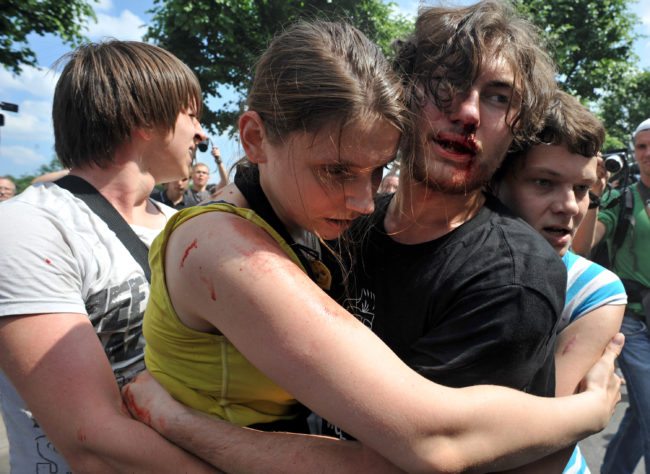How One Gay Man Fled from Russia to Belarus
Peter* had set up a Skype account just to speak to PinkNews.
Even though it has been six months since he left Russia to embark upon a new life in Belarus, he has to be cautious, and won’t tell me his real name.
An according to Peter, even sharing a post advocating for gay rights can result in your arrest.
“Everyone knows everything about you. You can go to jail just for reposting stuff on social media,” he said.
Living in a small Russian town near Moscow, the 32-year-old found that news quickly spread about his sexuality.

“People in the city saw us and the gossips told everyone around the city. After that everyone in the community knew,” he said.
Although he had lived in his hometown for as long as anyone could remember, his life as a gay man started to become difficult as pressures from religious groups and the government mounted.
Since the introduction of the gay propaganda law, the little protections LGBT+ Russians had have now dissipated.
In order to survive, Peter started to take lower paid work as a programmer, as his sexuality was used as a bargaining chip for him to take lesser paid work.
“I couldn’t find work or live my life normally. There’s a forum where gay freelancers and programmers are listed. Everyone in the community online and offline knew me,” he said.
“I would get lower paid work, when I could,” he added.
The stress of not being able to find paid work was compounded by the hostile reactions Peter faced from his family, which left him with no other options: he would have to move.
“My family knew about my sexuality, and were incredibly negative about me. One of the main reasons I left Russia was because I had so little support from my family there,” he said.
The pressure started to take its toll on Peter and his boyfriend.
After moving to a different city in the hope that life would improve, the relationship started to fall apart.
First, we lived together in a different city first, and moved together. But it may have been a different city, but the same attitudes remained. We couldn’t get work, and we were scared of being attacked. That’s when my boyfriend left me, and said “I don’t need this.” It’s really hard, and not everyone can manage to keep a relationship going under that pressure,” he said.
Now alone, Peter decided to ask a friend for advice on how to escape Russia, and decided to enter Belarus.
The post-Eastern Bloc nation of Belarus lies to the left of Moscow.
The landlocked country, which shares borders with Ukraine, Poland, Lithuania, and Latvia, is home to 9.5 million people – 800,000 more people than in London.
Around 8.3% of the country is made up of Russian migrants, and Russian is spoken as the country’s official language.
With its close ties to Russia, it was a feasible place for Peter to flee.
“You can access Belarus without a VISA or passport,” he said.
“It takes about two days to get to Belarus on the train. It took another three days on the car so we could get away from the border. You can go to Belarus without even a passport – it’s easier to enter even than Ukraine, which made the decision for me,” he said.
But unfortunately for Peter and other Russian LGBT+ asylum seekers, it shares a lot of the same hostilities.
In a recent anti-gay crackdown in October 2017, two gay night clubs were shut down in the country, with riot police taking the clubgoers’ data.
One of the people in the club was arrested in the process.
The crackdown was said to have been a direct order from the President of Belarus, Alexander Lukashenko.
The Belarussian leader, is described as “Europe’s last dictator” remarked that it is better to be a dictator than gay.
“When I got there, friends took me in and helped me out. They even helped me with money and work when I first arrived. In Belarus, it’s more tolerant than in Russia,” he explained.
“I still can’t work properly, but at least I know I won’t be killed here. It’s not so tolerant, it’s old-fashioned, but they won’t kill you, like what happened in Russia,” he added.
Apart from with a small group of friends, Peter now lives his life in the closet, disclosing his sexuality only when he feels it is safe.
“If anyone found out about my sexuality, they might get aggressive, or even start a fight. There is not one way people react. There are only two ways, but in Russia, there’s just one: aggression all of the time. Some people are really easy about it here, some people are ridiculously aggressive. But in comparison to Russia, it’s a lighter load to bear,” he added.
But, similar to other post-Eastern Bloc LGBT+ asylum seekers from Russia, Peter is concerned that time is not on his side, and a move out of the country is essential to his survival.
“I try to hide my sexuality now, but as I am facing a small community just like before, it’s only a matter of time before people find out,” he said.
“I am working to save money to get out of Belarus. I want to go to the EU, an English-speaking country, where people are more tolerant,” he said.
But while the UK continues to reject thousands of LGBT+ asylum seekers from entering the island, it appears that the plight of Peter and other LGBT+ Russian asylum seekers’ right to life may fall elsewhere.
*Peter’s name has been changed